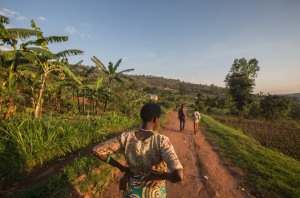Yesterday, the Rwandan Ministry of Education announced that it may cut all scholarships for university students next year and instead funnel the money into primary education. The announcement came from the Minister of Education, Charles Muriganda, in a Kinyarwanda radio broadcast.
A friend called me and told me about the broadcast, so I asked some local reporters for the scoop. Here’s what I learned:
The first move at the Ministry is to cancel a loan scheme, in which students could borrow RWF 25,000 a month (about $40), or 250,000 a year (about $400), to help pay for school. That’s not nothing: University education is not cheap here, at least relative to what most people earn. Rwanda’s state university, the National University of Rwanda, charges an average of roughly $1200 in annual tuition (though fees vary by program), and some private schools can cost as much a $2,000 a year, with books and supplies. So $400 a year helped out — to the tune of 25 to 30 percent.
But equally worrisome is what I’m told Muriganda called “the next step” — canceling all university scholarships. The merit-based scholarship program, which gives high-achieving secondary school students funds for college, may disappear next year, too.
As I understand it, this is not a funding cut, but a funding reallocation. Rwanda has free primary education through the third year of secondary school, amounting to nine years of free instruction. That’s boosted its primary enrollment rates to the highest in the region, according to the Rwandan government newspaper, the New Times. It also turns out to be darn expensive, and the funds saved on higher ed will go to the primary ed programs.
So far, it looks like genocide survivors will still qualify for scholarships through FARG, the Fonds National pour l’Assistance aux Rescapés du Génocide (National Assistance Fund for Genocide Survivors). But as the genocide recedes in time, the university student population is increasingly made up of those born just after the genocide.
Higher education everywhere is expensive, but financing a college degree on a continent where few people have access to credit is an especial challenge. Some friends of mine wondered if Rwandan students who take out private loans will be able to find jobs afterward to pay them back. Construction, for example, is booming in Rwanda — but the universities aren’t churning out majors in Construction Studies.
Halfway around the world, in Seattle, there’s a group trying to tackle this credit-for-college problem. Vittana is using a micro-finance model to get students loans for school. Think of it as a Kiva.org for college: You meet a student through an online profile; you loan them $25; and as they repay their loan, you get repaid.
During the nerd rockfest that was the Clinton Global Initiative, Vittana announced that it would give 10,000 loans of $1000 each to students in Africa. Vittana wants to educating people for work — in nursing, say, or IT. The announcement is Vittana’s first foray on the continent (it’s been working in Mongolia, Nicaragua, Paraguay, Peru and Vietnam), and the organization hasn’t decided to which of Africa’s 53 countries it will bring its $10,000 in loans, though Vittana says the most likely pilot countries are Uganda, Ghana, Kenya.
In a few months, Rwandan students may be asking, “Can you add us to the list?”




The 9-year-education programme arose itself from a funding reallocation. The programme means that you can continue free for 3 years after Primary 6 so long as you are content to go to a local day school, often extra classrooms tacked onto your primary school.
Before 9YLE started it was easier to get funding for university and that funding covered both fees and upkeep. Now the bar is higher (you need to get higher marks) and very high for those not doing sciences. And funding if you qualify (it is also now means tested) is (I think) a mixture of money and loan (the latter which you have to pay back but does not attract interest) or just loan.
If you do well enough in P6 you may get a place at a boarding secondary school (where the standard is going to be higher) but that costs money as before.
University is now difficult to access without govt funding unless you have a sponsor or have a job which enables you to get a bank loan. Such jobs are not easy to come by.
It is hard in my view to argue against reallocating funding to P7 to P9 since it means everyone can continue in education and maybe those who would previously have had to quit may be able to later on access vocational training (although i am not sure if there are yet enough places for such things – something the govt is working on I expect). The argument is that the country probably needs e.g. plumbers more than lawyers. And if the Vision 2020 goal of reducing those in agriculture from 90% to 50% is going to be approached then more people need education and training.
A further problem for potential university students is that tuition fees have increased markedly although more universities have opened in Rwanda and now that Rwanda is in the EAC Rwandans can also go to university in say Uganda or Kenya as “home students”.
I believe funding from FARG is also merit based so you also probably have to get good marks.
It would be excellent news if students were able to access student loans from outside Rwanda. Interest rates on loans from banks in Rwanda are high. What is really needed if the govt could afford it is greater access to loans at no or low rates of interest.
Finally, since Rwanda gets some bad press, I must mention that the funding reallocation is from the rich/middle class to the poor. Previously people with means got funding they did not need and students who performed poorly or who were just poor stopped education after P6. The argument is that if your university course will enable you to get a job you can afford to take out a loan to fund it.
http://www.newtimes.co.rw/index.php?issue=14409&article=7955
It says it will be implemented in 2011 i.e from January. It is one thing to introduce it, but quite another to apply it to existing students who, if they now have to quit, have wasted the years completed to date, possibly running up debts in the process.
Let’s also be honest here–NUR is churning out thousands and thousands of graduates each year that are unemployable due to the poor quality of their degrees (CS majors who “code” on paper, scientists who have barely set foot in a lab, etc etc etc). Reducing enrollment–no matter how painful it may be to some–will likely allow NUR to improve the quality of instruction and facilities, which is arguable a better outcome than educating as many students as possible on the campus of an ex-Belgian primary school.